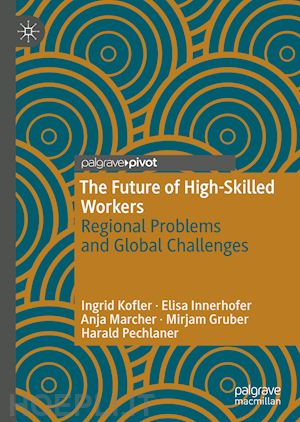

Questo prodotto usufruisce delle SPEDIZIONI GRATIS
selezionando l'opzione Corriere Veloce in fase di ordine.
Pagabile anche con Carta della cultura giovani e del merito, 18App Bonus Cultura e Carta del Docente
The nature of work is changing, due to demographic shifts, globalization, and digitization. Regional local labor markets are in global competition for (highly) qualified and specialized workers. At the same time, the workforce’s desire for flexibility and the increasing speed at which skill requirements are changing are producing disparities at the spatial, social, and economic levels.
This book discusses the global and local drivers behind these developments. It explores the factors which cause global inequalities between urban and rural areas, and highlights how cities, regions and countries attract these sought-after employees to address skills shortages. The book includes an in-depth case study on high-skilled workers in South Tyrol, Italy. No single academic discipline can adequately capture the dynamics of the future labor market, and the authors therefore take an interdisciplinary approach, combining insights from different disciplines. This book will bea valuable resource for policymakers, students and researchers seeking to understand the driving forces behind the ever-changing labor market and the future of high-skilled work.
1. Introduction .- 2. The future of high-skilled work – main developments and drivers of change .- 3. The high-skilled workers of tomorrow .- 4. Shaping the future organization of work and life .- 5. Does “place” matter? The importance of location factors .- 6. Specific case study: South Tyrol .- 7. Discussion and conclusion.
Ingrid Kofler is a sociologist. She is Senior Researcher at the Center for Advanced Studies at Eurac Research in Bolzano, Italy. She has held Visiting Researcher positions at the 21st Century Global Dynamics initiative, the University of California, Santa Barbara, USA, and at the Hamburg Institute of International Economics (HWWI), Germany.
Elisa Innerhofer is a business economist and political scientist. She is Senior Researcher at the Center for Advanced Studies at Eurac Research.
Anja Marcher is a geographer and researcher at the Center for Advanced Studies at Eurac Research. She is also a Junior Fellow at the Institute for Advanced Studies (IHS) in Vienna, Austria.
Mirjam Gruber is a political scientist. She is a researcher at the Center for Advanced Studies of Eurac Research, and a PhD candidate at the University of Leipzig’s Institute of Political Science.
Harald Pechlaner is a business economist. He isHead of the Center for Advanced Studies at Eurac Research, and Professor of Tourism and Head of the Center for Entrepreneurship at the Catholic University of Eichstätt-Ingolstadt, Germany.











Il sito utilizza cookie ed altri strumenti di tracciamento che raccolgono informazioni dal dispositivo dell’utente. Oltre ai cookie tecnici ed analitici aggregati, strettamente necessari per il funzionamento di questo sito web, previo consenso dell’utente possono essere installati cookie di profilazione e marketing e cookie dei social media. Cliccando su “Accetto tutti i cookie” saranno attivate tutte le categorie di cookie. Per accettare solo deterninate categorie di cookie, cliccare invece su “Impostazioni cookie”. Chiudendo il banner o continuando a navigare saranno installati solo cookie tecnici. Per maggiori dettagli, consultare la Cookie Policy.